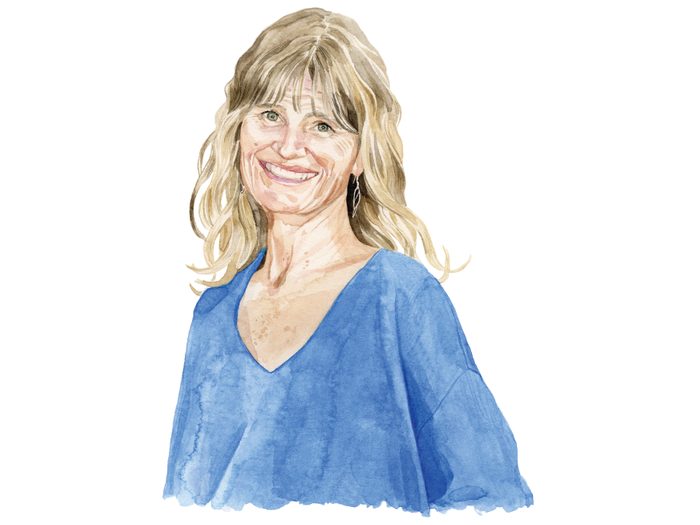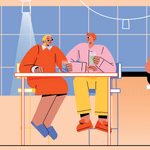Caring For My Dying Mom Showed Me That Caregivers Need More Support, Too

Canadian Health Advocates Inc.’s Paige Lennox on caregiver burnout.
My mom was a nurse, and as a kid I swore I’d never be one. Looking back, I think that was more about asserting myself as an individual than any feeling about the work she did. I always had the desire to help people, and I have a mind geared for science. I also really love seeing people get better and supporting them through their challenges. But I was determined to carve my own path.
I started school working toward a degree in microbiology but ended up graduating with a double major in science and nursing. I had shadowed one of the lab courses in the hospital training program and realized I was totally drawn to it. There came a point where nursing felt like the natural thing to do. My mom was doing refresher courses at the same time, so we were learning together and helping each other.
When I graduated, Canadian nursing jobs were hard to find. Thankfully my aunt was a unit clerk on a surgical unit in Calgary, and she helped me get a job right after I graduated. From there, I transferred to a trauma ICU, then to emergency departments. For 25 years now, I’ve worked in critical care.
You have to be on your game in critical care: People’s lives are in your hands. That’s what I loved about it—the intensity, the immediacy, the way you have to work as a team. And I loved advocating for my patients. Not all nurses do that. But I was always the kid who would fight for the underdog, who would stick up for people.
Through my last years of nursing in the hospital I started to see gaps in care for people—maybe because we didn’t have enough resources, definitely because doctors and nurses were overstretched. People were not understanding their diagnosis, treatment or why they were on certain medications. They were not having proper resources at home before being discharged from the hospital. I saw patients and families falling through cracks, but I didn’t realize just how challenging things were until my mom got sick and I went from health care worker to caregiver.
She was diagnosed with colon cancer, had surgery, did chemo—and did great. We thought the cancer was gone. Then it came back in her liver, and we went through the same thing again. Then it came back all through her body. For two years it was an absolute rollercoaster.
During that time my mom moved in with my sister, who is a single mom. They were down in southern Alberta and I was in B.C. It was a challenge for me to help from a distance, especially because I was overseeing the medical side of my mom’s care.
In critical care nursing you have to have boundaries with your patients to protect your own mental health. You see a lot of sad things. With my mom, I didn’t have any boundaries. I thought, I’m healthy, I’m strong, I’m able to do the physical care that she needs. I can talk to the doctors, I can make sure that the test results are being reviewed, I can make sure that she’s on the right medications. I can protect her dignity through this. It absolutely was a way for me to show love to my mom. But I wasn’t prepared for how difficult that was to do from a distance. I was trying to work full-time but I was away a lot, and when I was at work, I wasn’t always present. I ended up taking a leave during the last few months of my mom’s life.
We had a tumultuous relationship. I was the troublemaker of the family. I was a rebellious teenager and that continued into my young adulthood. Thankfully I grew out of it and began to have a good relationship with Mom. The greatest healing happened in the last three months of her life. And I learned a level of love and compassion that I’ve never experienced before. It changed me as a person. Our parents raise us: They change our diapers, they feed us, they cradle us. And I was able to do that for my mom, just hold her like a baby in the last few days of her life.
During that time, I kept thinking, What do people do who don’t have a nurse in the family? How do they get help from someone who can ask the right questions, oversee care and make sure they are getting all the resources they need? What if you don’t have access to a hospice where nurses are trained to talk about death? I was educated in the health care system, I was confident I could get my mom exactly what she needed, and I still struggled. Communicating with the health care team was hard. They were so busy and it was difficult to get the information I wanted about how Mom was doing when she could no longer tell me herself.
After Mom died, I let my permanent position go. I wanted to figure out a way to combine my nursing knowledge and my passion for helping patients navigate our system. I started looking for work and quickly found there were no patient advocacy organizations in Canada. That’s how I came up with Canadian Health Advocates Inc. (CHAI), which is a network of health care professionals available to help people navigate an often confusing system. Our nurses help ensure people get consistency of care, they explain the unfamiliar, they can do research, they can help with paperwork and future care plans—they help patients and families during a scary and emotionally fraught time. It’s the type of service I wish I’d had when my mom was sick.
In a hospital, long-term care facility or hospice, there isn’t a lot of consistency. You see a lot of different doctors. My mom had her primary oncologist but also saw a team of residents, ever-changing nurses, specialists and techs. It’s hard to keep track of who is responsible for what. And you can’t make good decisions if you don’t have all the information or the right education hasn’t been provided. If you’re sick or tired or frustrated, you’re going to retain even less. It’s important to go to your appointments prepared with questions and with somebody to take notes, which is just one of the services CHAI can provide.
We’ve helped close to 300 patients and families now. Often we’re the first people who have actually had time to sit and listen to their stories. A lot of people have lost trust. They’ve lost faith in the health care system, whatever their situation is. There’s so much information out there, how do you begin to siphon through it, how do you decode the medical jargon and get a good understanding of what’s happening to you?
With our large aging population, more and more people are going to be thrust into the position of caregiving out of necessity. And a lot of people will be juggling that with full-time work, children of their own and limited resources. I’m a health care professional and I still would have benefitted from having the support of an advocate. I want to make that available to everyone.




